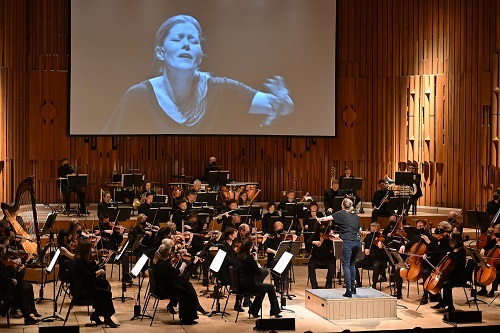Barbara Hannigan’s quasi-miraculous and multifaceted feats in this concert with the London Symphony Orchestra at the Barbican Hall made me reflect on what it is and means to ‘conduct’ a musical performance. Hannigan makes much of her dual roles of singer and conductor – often embodied simultaneously – but in devising a concept which made Poulenc’s 1958 soprano-showcase, La voix humaine, entirely about ‘herself’, Hannigan seemed to be inferring that, as a conductor-singer whose performance was both displayed on stage-dominating screen above the orchestra and witnessed ‘from behind’ by the audience, she herself was ‘the work’.
Poulenc based his 45-minute monologue on the eponymous 1928 play by his friend, Jean Cocteau, in which the female protagonist, ‘Elle’, speaks to her lover on the telephone as he breaks off their relationship. She cajoles him, lies to him, begs him, berates him. Their conversation, frequently interrupted by the unpredictability of the French telephone network, is a fractured farewell, painfully elongated. The telephone is thus shown to impede and desensitise human relationships.
So, Cocteau’s telephone – represented by Poulenc as a tinny xylophone jangle – is important. As Elle is connected to, “Allo, allo”, and disconnected from, “On avait coupé”, her lover, the telephone becomes part of the ritual of the work. And, as it ties Elle to her lover, so it keeps him physically removed. In the opera, the orchestral fabric serves to both intimate the lover’s voice, which we don’t hear, and embody Elle’s schizophrenic mood swings, which represent her psychological response to that unheard voice. So, the lover is both absent and present. When in the closing moments the telegraphic thread which connects them is finally, irredeemably broken, the music stops – as it must: the telephone silences the voice. And, its cord figuratively strangles the suicidal Elle.
In Hannigan’s reading there is no lover and, in her execution, no telephone. There is just Elle – or, rather, Elle’s disintegrating psyche. Picking up on Elle’s confession that she has been untruthful, Hannigan’s imagines, ‘What if it’s all a lie?’ From Huckleberry Finn to Humbert Humbert, from the second Mrs de Winter to Anthony Burgess’s sociopathic Alex, unreliable narrators deceive for many reasons. Hannigan’s Elle seems less unreliable than insane. There is no reason for her to mislead, indeed there is no-one to mislead, since the orchestra and audience are merely projections of Elle’s own mental apocalypse.

Since Roberto Rossellini’s 1948 film version of Cocteau’s play (retitled L’Amore) there have been several translations to the screen, including, recently, Patrick Kennedy’s 2018 The Human Voice (starring Rosamund Pike) and The Human Voice directed by Pedro Almodóvar in 2020, and starring Tilda Swinton. For this live video, Clemens Malinowski positioned three cameras which relayed Hannigan’s every gesture and expression – sometimes in soft, blurred focus; sometimes overlain or mirrored in triplicate; sometimes with monochromic razor-sharpness – as Elle clawed, punched and convulsed her way through emotional meltdown, her pulsing stabs of hand, arm and head kinaesthetically beating time in an expressionistic present.
Occasionally the frantic movements paused, as when Hannigan balanced on one leg, the other extended behind her – a sort of balletic parody of delusion. At times we were confronted with only an outsized eye, staring, twitching, rabid. Or, with the tortured rictus of Elle’s mouth, an emblem of her fragile, fractured spirit. Arms outflung, head dangerously tilted backwards, eyes clenched shut, Elle became a freeze-frame of anguish as Hannigan turned to face the audience – although as ‘Elle’ stared not at us but through us, it was clear that there could be no real ‘connection’ between performer and listener.
The LSO played Poulenc’s sensuously scented score with customary accomplishment, and the contrasting moods of the mosaic-like episodes were nicely delineated, but, if I’m honest, it was hard to focus on an orchestral soundtrack that ‘existed’ only in Elle’s head, when Elle herself so dominated one’s senses and experience.
The programme indicated that a video (directed by Malinowski, Hannigan and Denis Guéguin) would also accompany Richard Strauss’s Metamorphosen, which opened the concert. In the event, it failed to materialise, which was probably just as well, given that the terrible images currently unfolding on our screens are sufficient reminder that Strauss’s ‘study for 23 solo strings’, composed during the final months of the Second World War, is often considered the 81-year-old composer’s personal elegy for the decline of Western culture.
Strangely, here Hannigan’s approach veered towards minimalistic at times. The celli and basses were left to their own devices at the start as Hannigan stood with her head bowed, arms by her side, waiting until the entry of the first of the ten violins to gesture her intent to the players. This was a measured performance is several senses of the word. The structure was well-perceived, the various climaxes carefully shaped and graded, the journey finely judged. But, the tone was rather muted. Perhaps it was the Hall’s acoustic but this Metamorphosen never quite seemed to peak. There was some lovely string playing, especially in the more soloistic episodes, but that Straussian glow was lacking.
Hannigan received a standing ovation at the end of the performance. And, why not? This was a stunning demonstration of technical skill, artistic invention and expressive commitment. But, Poulenc’s opera is a delicate thing, an intimate journey into a vulnerable subjectivity and interiority. Here, it was a misconceived exercise in musical megalomania.
Claire Seymour
Barbara Hannigan (soprano/conductor), London Symphony Orchestra
Richard Strauss – Metamorphosen; Francis Poulenc – La voix humaine
Barbican Hall, London; Thursday 24th February 2022.